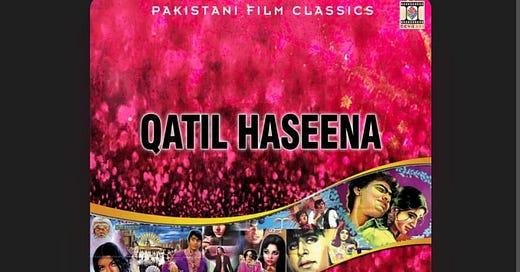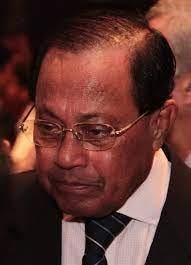Ataur Rahman Khan was a veteran politician with the unique achievement of becoming both the Chief Minister of East Pakistan and the Prime Minister of Bangladesh. He achieved the first in the 1950s, when his Awami League commanded a majority in the provincial assembly after the 1954 election. His government was dismissed in October 1958, when Iskander Mirza and Ayub Khan declared martial law. He remained steadfastly opposed to the Ayub regime, but formed his own party — Jatiya League — after Sheikh Mujibur Rahman pipped him to the AL leadership. He was arrested by the Pakistan army in March 1971.
After Liberation, Mr Khan was elected as an opposition MP in both 1973 and 1979. A key member of the BNP-led alliance against the Ershad egime, he was considered a principled, seasoned counsel to the political neophyte Mrs Khaleda Zia. I don’t know if she ever asked why he became the prime minister under HM Ershad’s military dictatorship. But Mr Khan’s quip to a journalist was that he joined the general to help him shed his uniform and promote democracy.
I am often reminded of this veteran politician whenever debates around potential allies in Bangladesh’s struggle against tyranny comes up. As we prepare for yet another likely sham election, how do we choose trusted allies?
One way to choose allies one can trust is by applying some form of litmus test — such and such can’t be trusted because of attending Shahbag, or supporting the 1/11 regime, or once sitting in the same table with Gholam Azam, you get the idea. One problem with this approach is that it can become dogmatic quite quickly. And what is the correct litmus test anyway?
An alternative approach might be to ask two sets of questions. First, consider the person’s stated aim. What do they say they want? Why do they want it? How do they propose to get it? Second, are their actions consistent with their stated aim? If they can explain in a satisfactory way that their actions are consistent with their aim — and note, its their aim, not ours, we don’t have to agree with their aim — then perhaps they can be given the benefit of the doubt. If they can’t, then they are likely to be an opportunist.
Let me explain the framework, applying it to Ataur Rahman Khan and another of Ershad’s prime ministers. Mr Khan wrote about his political life in a set of memoirs. In the first two, covering the 1950s and 1960s, he tells us how democracy in Pakistan didn’t fail but was never given a chance. The one on the 1980s reads as a series of anecdotes, there is no clear explanation why he joined a military dictatorship in ripe old age when he refused to do so in his political prime. Was he simply duped? Did he give into some base instinct like vanity or greed? Did he simply become an opportunist, a dalal?
Khan wasn’t the only seasoned politician to leave Mrs Zia’s side to become Ershad’s prime minister. Several decades younger than Khan sahib, Moudud Ahmed worked for a free Bangladesh in the 1960s London, and as a political assistant to Sheikh Mujibur Rahman in the lead up to the 1970 election. He was a senior official in the Mujibnagar government, but didn’t approve of the Mujib regime. He became a minister in the Zia regime, and was initially jailed by Ershad, before being released to cabinet to the posts of prime ministership and vice presidency.
Like Ataur Rahman Khan, Moudud too wrote of his experience in several books that serve both as memoir as well as critical political economy analysis. And he makes a better job explaining himself — that he preferred Ziaur Rahman’s vision of the Bangladeshi identity and market driven modernisation over the cult of Mujib and overtly pro-Indian cultural identity or any form of pan-Islamism, and in the 1980s Bangladesh he made a judgment that the military dictatorship was more likely to be successful than Mrs Zia in upholding Zia’s visions. He stood by that judgement in the lead up to 1991 election, and became an MP on the Jatiya Party ticket.
Mr Ahmed did eventually return to BNP, and stood by the party till his death.
It seems to me that there is a crucial difference between Ataur Rahman Khan and Moudud Ahmed. If they were still alive, Moudud would have been a trusted ally.
John Maynard Keynes once quipped that When the facts change, I change my mind. What do you do sir?
Facts have changed fundamentally in Bangladesh. We have never had a totalitarian regime like the current one. That’s one fact. Another is that a broad alliance is the best possible way to end the tyranny. In the light of these facts, one’s past cannot be the sole filter of trust. We should ask what a potential ally’s stated aim is, and then judge their actions against their statements.
A few more examples of this framework: the editor of the country’s largest daily can be given a benefit of the doubt, even if one strongly disagrees with his politics; a self-styled editor emeritus, on the other hand, shouldn’t be trusted — not because he is a regime hack, but because of the murkiness around his ideological compass; a journalist exiled in Sweden can be trusted because his commitment to human rights is clear, and his political stance is consistent with his ideas; a Paris based hit youtuber on the other hand is suspect because it’s not even clear what he believes in; an Illinois based professor can be an ally because his actions and statements are consistent with his stated ideology, but a Dhaka University professor who is now under attack from the regime might be best left to himself because of his hypocrisy around human rights violation; and so on.
Doveryai, no proveryai is a Russian proverb that Ronald Reagan popularised in the 1980s. It means trust, but verify. Based on a years-old post.
Correction: an earlier version included the photo of Khan Ataur Rahman, the artist.
Further reading
অস্থায়ী রাষ্ট্রপতির দায়িত্ব ছাড়ার সময় ১৯৯১ সালের ১০ অক্টোবর ‘বিচারপতি সাহাবুদ্দীন আহমদ: একজন অন্তর্মুখী মানুষের কথা’ শিরোনামে একটি লেখা আজকের কাগজে প্রকাশিত হয়েছিল
মতিউর রহমান, 19 March 2022
Akbar Ali Khan’s journey of discovery
Indeed, for much of his life, the work of Akbar Ali Khan, the voracious reader, the dedicated scholar, the relentless writer, and the courageous public intellectual, has been a journey of discovery
Syed Akhter Mahmood, 12 Sep 2022
শাওন ও নয়নরা নতুন কিছু বলছে কি
নিম্নবর্গ কি তবে রাজনৈতিক মধ্যপন্থাকে বেশি কাজের ভাবছে? নাকি সুশীল মধ্যবিত্ত এবং অপ্রাতিষ্ঠানিক খাতের মানুষেরা রাজনৈতিক স্বার্থের দুই বিপরীত মেরুতে দাঁড়াচ্ছেন ক্রমে? এটা কী তবে রাজনৈতিক অর্থনীতির একটা মোড় বদল?
আলতাফ পারভেজ
In Dhaka, a prime minister’s ‘vendetta’ is shaping politics
With an election looming, Sheikh Hasina’s criticism of Nobel winner Muhammad Yunus is intensifying
John Reed, 13 January 2023
Extrajudicial killings and disappearances have dropped dramatically, with the government aware the world is watching.
Mubashar Hasan, 26 January 2023
Zulkarnain Saer Khan was part of Al Jazeera’s investigation that unearthed links between the prime minister and criminal gangs.
Yarno Ritzen, 24 March 2023
'Can't afford rice' quote lands journalist in jail
Anbarasan Ethirajan, 30 March 2023
There are too many unexplained gaps in the story
Aasha Mehreen Amin, 30 March 2023
And for comic relief…..





